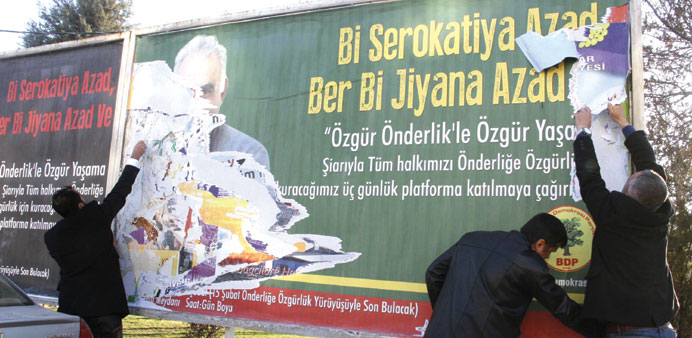This picture taken on February 11 shows plainclothes police officers tear down a billboard with a picture of imprisoned Kurdish rebel leader Abdullah Ocalan in Diyarbakir. The face of jailed Kurdish rebel chief Ocalan briefly beamed down from billboards in southeast Turkey until police tore down the posters, a mark of official unease over his enduring influence among Kurds as local elections loom. The slogan on the billboard reads in Turkish and Kurdish ‘With free leadership to free life’.
Reuters
A spate of attacks on Turkey’s pro-Kurdish People’s Democracy Party (HDP) is harming its ability to campaign for local elections later this month and threatens the fairness of the outcome, party leaders said yesterday.
Public officials, including members of the police, are involved in the attacks in an attempt to stoke Turkish nationalist sentiment ahead of the March 30 mayoral elections, Ertugrul Kurkcu, HDP co-chairman, also told a news conference.
On Sunday, dozens of men threw rocks through the windows of an HDP office in the Mediterranean city of Fethiye and tried to tear down a party emblem from an outside wall, footage from the IMC television channel showed.
Police formed a barricade to hold back an angry crowd waving Turkish flags and numbering in the hundreds, although they did not prevent a few dozen approaching the building with sticks and stones.
In the end, firefighters using an engine ladder tore off the HDP sign and threw it onto the ground.
Kurkcu said the incident in Fethiye was the 20th attack on their party since the start of the year.
“The security of this election has been destroyed,” Kurkcu said. “These attacks are not happening on their own. Behind each attack has been a public security official.”
The HDP is a sister party of the Peace and Democracy Party (BDP), which dominates much of the mainly Kurdish southeast.
The HDP was formed late last year to contest in the mayoral election in western Turkey, where Kurds are in a minority.
The BDP and HDP support peace talks between the state and Abdullah Ocalan, the jailed leader of the Kurdistan Workers Party (PKK) to end a three-decade Kurdish insurgency.
Negotiations with Ocalan, who is serving a life sentence on an island off the Istanbul coast, are a deeply contentious issue for many Turks who blame the militant leader for the deaths of 40,000 people during the conflict.
Ocalan called on Prime Minister Recep Tayyip Erdogan’s government to stamp out the forces driving the attacks on the HDP and said they were aimed at disrupting the peace process, according to a statement released by an HDP delegation that met with him under the framework of the peace talks.
“All democratic elements and our people should take the necessary measures in the face of these unacceptable attacks that are testing the (peace) process,” Ocalan said.
The PKK took up arms against the Turkish state in 1984 in a bid to carve out an ethnic homeland, but has since scaled back its demands to greater political autonomy and cultural rights.
The PKK called a ceasefire in March 2013 to support the peace talks, seen as the best chance yet to end the violence.
Kurkcu said that the HDP will apply to the Organisation for Security and Co-operation in Europe (OSCE), a rights watchdog, to help ensure security during the election and will request that the European Parliament provide observers during the balloting.
HDP officials have received death threats, have had their buses pelted with rocks and their offices destroyed by looters, according to a party statement.

